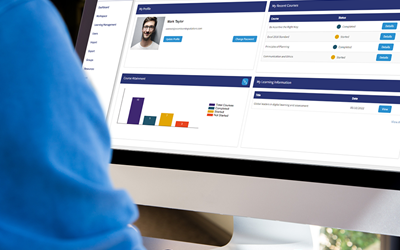How competency powers our planet
Training for, assessing, and ensuring competence should make life safer – for workers and the customers they serve. Competent workers are also more productive and efficient, which in turn, benefits the business for which they work and provides value for the organisation’s stakeholders.
Posted 26 April 2022
Nowhere is this more important than in the energy industry – not least because this industry is currently at the forefront of the world’s climate change debate and it forms a hugely significant part of the global economy. It includes all forms of energy, such as petroleum products and oil, natural gas, gasoline, diesel fuel, heating oil, and nuclear, as well as renewable energy via hydropower, biofuels such as ethanol, wind power, and solar power.
The need for a constantly competent workforce is now
The oil and gas drilling industry alone affects the life of every person on the planet and comprises some 3.8% of the global economy, with revenues of some $3.3 trillion in 2019. Add to that the renewables sector, which is growing strongly in the wake of the climate change debate as well as other world issues, and it becomes obvious that the energy industry needs a constantly competent workforce – from the points of view of safety (for its workers and all of us on the planet), efficiency and productivity.
Where eLearning fits into the equation
All of the major players in the energy sector have an energy transition document and an energy transition target to make their activities more environmentally friendly. The change projects, new processes, and procedures that will come from this will create a plethora of learning. eCom aims to support the industry to get that right first time and put employee learning and development front and centre of those projects
Energy projects and eAssessment
Among eCom’s recent and on-going energy-related projects are a major eAssessment programme, in conjunction with the International Well Control Forum (IWCF), the only independent body focused on oil and gas well control planning and accreditation. Introduced at the end of 2016, this programme has already assessed some 30,000 candidates online. The online assessments, which include both knowledge and practical elements, are available in 17 languages.
The programme – known as FORUM and delivered via eCom’s assessment management platform, eNetAssess - allows invigilators to monitor student progress, automatically mark online tests, record practical assessments, manage and verify certificates, as well as deal with question authoring and multiple translation versions. FORUM also provides IWCF administrators, centres, assessors and invigilators with a single platform for reviewing candidate details - and enables external users to authenticate and check the validity of a certificate. In addition, FORUM issues successful candidates with electronic certification (eCerts) - significantly reducing waiting times for candidates to get their qualifications.”
eCom has also helped Operations Geoscience International Competency Assessment (OGICA), a UK-registered, not-for-profit collective of experienced energy industry professionals, to create an online self-assessment tool to benchmark individuals’ skills and identify skills gaps within the international operational geoscience community, notably for those working operationally in upstream oil and gas geoscience.
Our work in offshore wind
eCom’s work in the renewables sector includes developing bespoke eLearning materials to help make offshore wind turbine maintenance technicians’ jobs safer – especially when they are working in rough seas. eCom has researched and produced these eLearning materials for the engineering innovator, Pict Offshore - part-owned by Ørsted, the world’s largest offshore wind developer.
To increase adoption of its laser-guided, active heave-compensated personnel hoist, called the Get Up Safe (GUS) system, Pict wanted its customers around the world to have a cost-effective way to realise the system’s benefits as quickly as possible. The GUS system’s applications now include it being deployed off the North-east US coast - at the 132-megawatt (MW) South Fork Wind offshore wind farm, as well as at the Revolution Wind and Sunrise Wind projects. This trio of offshore wind farms are producing a total capacity of some 1.8 gigawatts (GW).
"This initial training needs to be delivered consistently every time and cover important safety information, for both normal and emergency situations,” explained Susan Gearing. Pict also wanted to include an end-of-training assessment to check each user had assimilated the information and was ready to progress to practical training.
The importance of identifying workers competency
Without assessment materials, no one could objectively identify workers’ competency levels. Without learning and development materials, achieving job and professional competency would take longer, be more haphazard and offer more opportunities for making potentially costly mistakes along the way. Moreover, making these materials and assessments available digitally means they can be accessed almost anywhere, at any time as well as adapted for different cultures and made available in a wide range of languages. Furthermore, these materials’ digital nature means organisations and their workers will always access the materials’ most up-to-date versions.
Worker competency is an increasingly important aspect of working life but, as technology develops and the time to achieve competency contracts, so technology – in the form of digitally delivered learning materials and assessments – enables these demands to be met.
Recent Posts
eCom Learning Solutions: Staying ahead in a constantly evolving landscapeIs your work changing, or just your tools? A question for the modern workforce
What is competency? And why it matters in the workplace
Bridging the integrity gap: A proactive approach with eNetEnterprise
Proving Learning Works: Trends Driving Workplace Training in 2025


